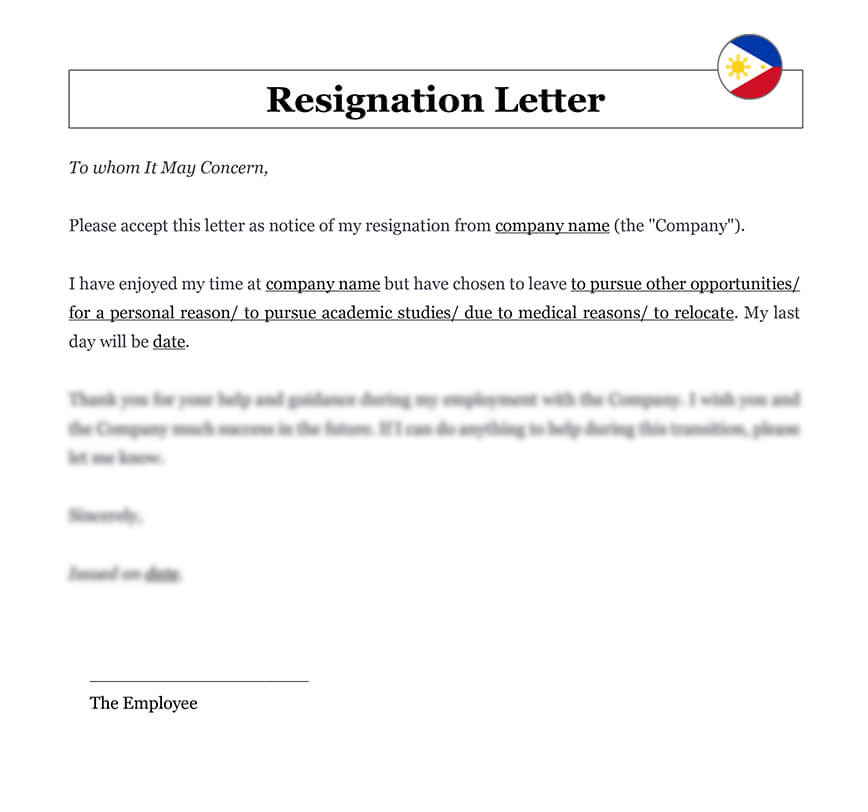Ready to use legal template
Work on without any hassle
Compliant with Filipino law
Ready to use legal template
Work on without any hassle
Compliant with Filipino law
Learn more about Employee Resignation Letter in Philippines
Writing an Employee Resignation Letter is an important step for anyone leaving their job in the Philippines. Not only is it a professional courtesy to provide notice to your employer, but it is also a legal requirement under the country’s labor laws. A resignation letter provides documentation of the employee’s decision to resign, the effective date of resignation, and any other important details or reasons for leaving. It also helps to maintain a positive relationship with the employer, as it demonstrates respect for the company and its policies. Themis Partner offers a Resignation Letter that will ensure compliance with Philippine legal requirements and ensure a smooth transition for both the employee and the employer.
Table of contents
What is an Employee Resignation Letter?
Why Employee Resignation Letters are important?
How to write a professional Employee Resignation Letter?
What are the mistakes to avoid when writing an Employee Resignation Letter?
What are the legal requirements for Employee Resignation Letters in the Philippines?
How to notify your employer of your resignation?
What is an Employee Resignation Letter?
An Employee Resignation Letter in the Philippines is a formal document that an employee submits to their employer to inform them of their decision to resign from their job. The letter typically includes the employee’s name, position, and the effective date of their resignation. It may also include the reasons for the resignation, a statement of appreciation for the opportunity to work at the company, and any other relevant details or requests. The purpose of an Employee Resignation Letter is to provide notice to the employer and to formally document the employee’s decision to resign, which is a legal requirement in the Philippines under the country’s labor laws. A resignation can also take the form of a letter of resignation.
- Remarks:
You will need to check your Employment Contract to find out how many weeks’ notice you must give in the event of resignation.
ℹ️ If you are the employer and wish to terminate an employee, then Themis Partner also provides you with the Employee Termination Letter.
Why Employee Resignation Letters are important?
Employee Resignation Letters are important for several reasons. First, they provide a formal notice to the employer of the employee’s intention to leave the job. This allows the employer to make necessary arrangements for the smooth transition of work responsibilities, such as finding a replacement or redistributing workloads.
Second, resignation letters are a professional courtesy to the employer and can help maintain a positive relationship with the company. It shows that the employee respects the employer’s policies and procedures and wants to leave on good terms.
Third, resignation letters serve as a legal record of the employee’s resignation. In the event of any disputes or misunderstandings, the letter can serve as evidence of the employee’s decision to resign and the agreed upon terms of their departure.
How to write a professional Employee Resignation Letter?
Here are some tips on how to write a professional Employee Resignation Letter specifically in the Philippines:
1. Begin with a clear statement of resignation: Start your letter with a clear statement that you are resigning from your position. Include the date you intend your resignation to take effect.
2. Express gratitude: Thank your employer for the opportunities and experiences you have gained while working for the company. Express appreciation for the professional growth and development that you received during your tenure.
3. Provide reason for resignation (optional): While not required, you can provide a brief explanation for your resignation. This could include personal or professional reasons that led you to resign.
4. Offer to assist in the transition: Let your employer know that you are willing to assist in any way you can to ensure a smooth transition. Offer to help train your replacement or complete any necessary tasks before your departure.
5. Be concise and professional: Keep your letter brief and to the point. Use a professional tone and avoid any negative comments about the company or your colleagues.
6. Close on a positive note: End your letter on a positive note, wishing the company continued success and thanking them once again for the opportunities provided to you.
7. Provide a signed hard copy: Once you have written the letter, print it out and sign it before submitting it to your employer. You may also provide a digital copy via email.
What are the mistakes to avoid when writing an Employee Resignation Letter?
Here are some common mistakes to avoid when writing an Employee Resignation Letter:
| ➤ Not giving enough notice: It is important to give your employer sufficient notice of your resignation. Check your employment contract or company policy to determine the required notice period. |
| ➤ Being unprofessional: Avoid using a negative or unprofessional tone in your letter. Be respectful and courteous in your language and tone. |
| ➤ Not following company policy: Make sure to follow the company's policies and procedures when submitting your resignation letter. This may include providing a hard copy, sending an email or providing a digital copy, or notifying your immediate supervisor. |
| ➤ Not proofreading your letter: Make sure to proofread your letter for any typos or grammatical errors. A well-written letter shows professionalism and attention to detail. |
| ➤ Not expressing gratitude: Failure to express gratitude for the opportunities provided can leave a negative impression on your employer. Show appreciation for the time you spent at the company and the experience gained. |
| ➤ Including too much personal information: Keep your letter professional and focused on the resignation. Avoid including unnecessary personal details or information that is not relevant to your resignation. |
| ➤ Being too negative or critical: Avoid any negative comments about the company or your colleagues. Keep your resignation letter positive and respectful. |




